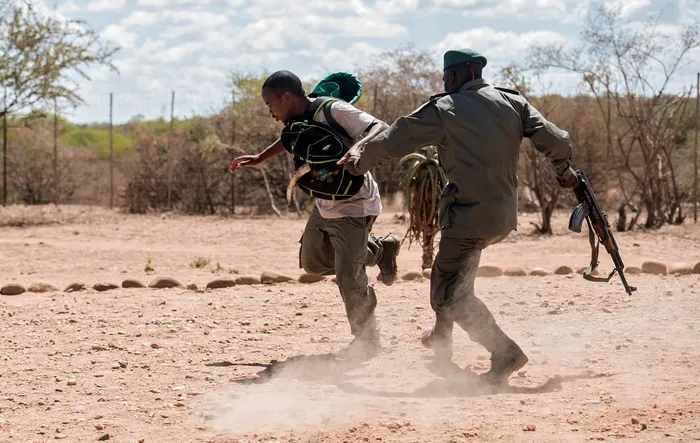Poachers shot and killed by KNP rangers in recent days

Staff of Mozambican anti-poaching authorities demonstrate their skills to journalists at the Limpopo National Park, just across the Kruger National Park, Gaza Province, Mozambique They enacted how they handle real-life poaching situations. l EPA/SHIRAAZ MOHAMED
A number of suspected poachers were shot dead by Kruger National Park (KNP) rangers in two separate incidents over four days.
Poaching in the world-renowned KNP, arguably the biggest tourist attraction in the country, has dwindled over the years with park officials introducing security systems, including cameras and free-running-hounds that detect poachers.
However, rangers are still expected to patrol the nearly 2 million hectares park, sometimes facing off with the ruthless, gun-wielding poachers.
South African National Park spokesperson, JP Louw, said rangers were recently forced to shoot and kill poachers in two separate incidents.
“On Friday, June 14, 2024, just before dark, rangers made contact with a group of armed suspected rhino poachers who were armed with a high-calibre rifle, an axe and other poaching equipment. One of the suspects was fatally wounded on contact while the others escaped. A rifle and ammunition were recovered at the scene,” Louw said.
Four days later, a similar incident took place.
“Late on the evening of June 18, 2024, rangers encountered an armed group of suspected rhino poachers. During the contact, two of the suspects were fatally wounded and a heavy calibre hunting rifle, ammunition and other poaching equipment were seized. Both incidents are currently being investigated by the SAPS,” he added.
Louw said the two incidents in the park in a space of four days were a highlight of the dangerous conditions rangers operated under.
He said it particularly demonstrated the threats they face against heavily armed suspected poachers.
“Incursions on the eastern boundary are still relentless and the anti-poaching units have been under a lot of pressure… SANParks is also exploring numerous interventions which include community mobilisation and support to push back against the continuous poaching threats,” he said.
“The park, which is bordered by Mozambique and Zimbabwe, was reportedly, for the first time since last year, surpassed by KwaZulu-Natal (KZN) as poachers targeted the site to poach rhino for its horn.”
According to the Department of Forestry, Fisheries and the Environment, the Kruger, last year lost 78 rhino as opposed to 307 in KZN.
Earlier this year, The Star reported that poaching in the KNP could spell the end of its existence if it is not curbed.
Richard Sowry, a regional ranger at the KNP’s Pafuri camp, said this could have devastating economic, social and ecological implications.
“Humans seem to think that there would not be adverse problems from it… We all see the problems because we are all connected ecologically.
“The system is very connected to us as humans; it affects water and clean air… the number of people the KNP directly employs will be affected. Even those that live outside the park work here and they go buy their food and clothes at shopping centres out there, but without the park, those shopping centres would have to close down,” he said.
Sowry added that poachers used all forms of methods, including poisoning, which could be the worst kind because of ripple effect it caused.
Saturday Star
mashudu.sadike@inl.co.za
Related Topics: